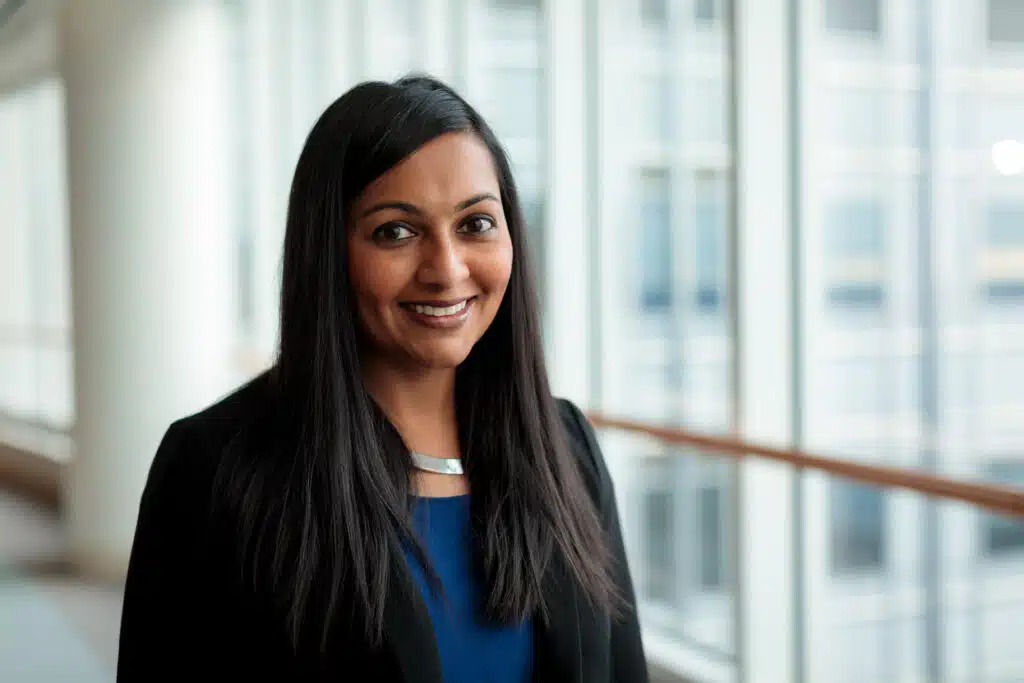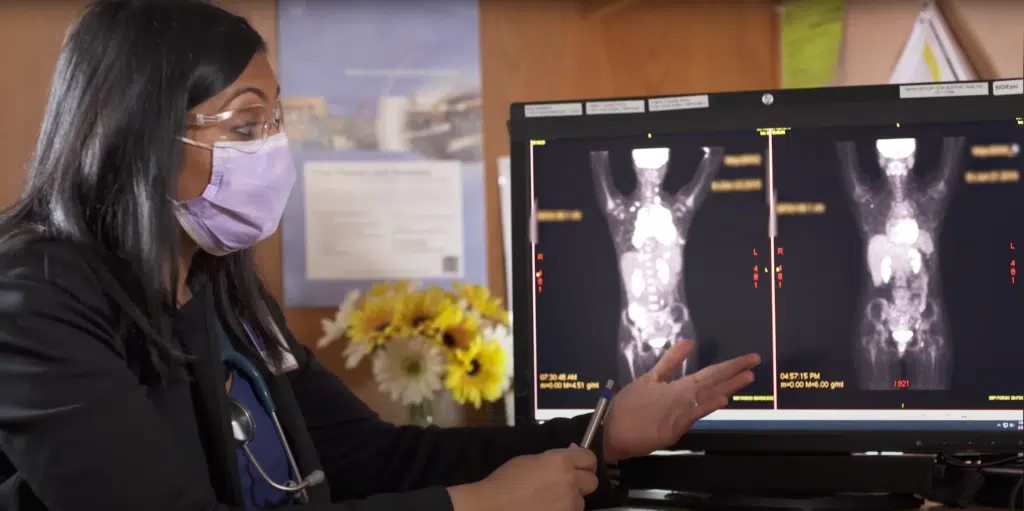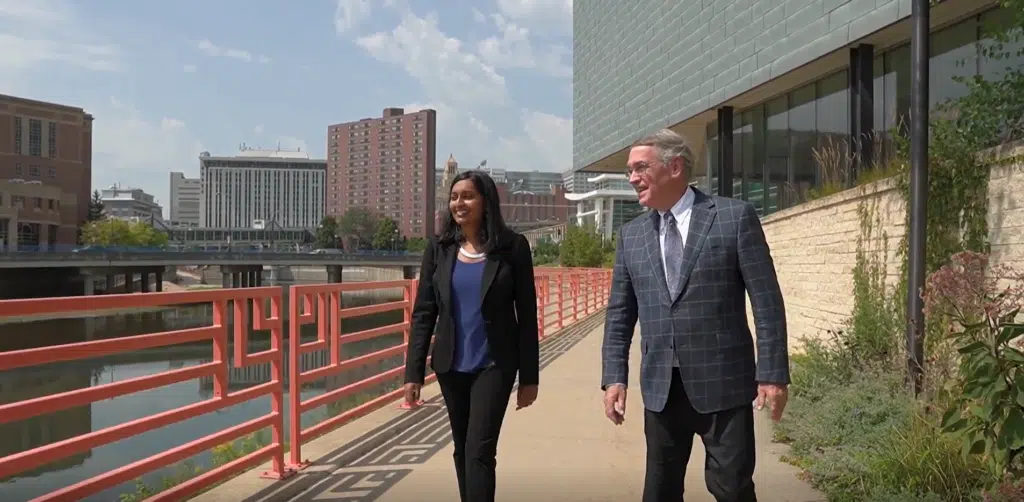Helping Patients With Lymphoma Live Not Only Longer, But Better

As the daughter of a Malaysian diplomat and an international environmental lawyer, Gita Thanarajasingam, MD, a hematologist at Mayo Clinic in Rochester, Minnesota, had a truly global upbringing. From Kuala Lumpur to New Delhi and New York, to graduating from high school in Brasil, her international experiences have helped shape her unique perspective on helping others – one that would eventually lead her to revolutionize how we think about lymphoma treatment.
Finding a Passion for Medicine
Dr. Thanarajasingam path to medicine began during high school in Brazil, where she worked as an informal interpreter at a medical clinic in the Amazon region.
“I am the child of two people who dedicated their lives to making the world a better place,” she said. “Neither of my parents were physicians, but they emphasized the endeavor to make things better for the people around you, and medicine was a natural connection to that.”
“After I’d been there about two years, my Portuguese was passable enough that I was useful for translating between international physician volunteers and local site staff and patients,” she said. “That’s when I realized that medicine is a universal language that encompasses a truly meaningful way to help people.”
That early experience set her on a path through Yale University, medical school and fellowship at Mayo Clinic, residency at the Brigham and Women’s Hospital at Harvard University, and eventually to her current role as a lymphoma specialist and researcher at Mayo Clinic in Minnesota. She found her true calling while in medical school.
“I fell in love with hematology during my second year of medical school,” she said. “The blood is just so complex, and it’s so important. I remember the hematology course director Dr. Alexandra Wolanskyj-Spinner, who evolved into a crucial mentor to me, showing the first picture of a blood smear I had seen. It looked like art to me. It was so beautiful and so powerful, and I became inspired by hematology, which felt like a natural fit for me.”
Focusing on the Patient Experience
Today, Dr. Thanarajasingam lives in Rochester with her husband, Ben, who is an emergency physician, their 11-year-old daughter, Kiran, and 7-year-old son, Arjun. Her research focuses on an often-overlooked aspect of cancer treatment: treatment tolerability for the patient. While much attention is rightfully paid to treatment effectiveness, she identified a critical gap in understanding the nuances of a patient’s journey while undergoing treatment.
Her typical workdays are spread among seeing patients with a variety of subtypes of lymphoma and in a variety of different stages of treatment in Mayo Clinic’s outpatient clinic. She also takes care of lymphoma patients who are hospitalized for treatment or disease-related symptoms. Simultaneously, she juggles clinical responsibilities with research time, collaborating with her mentors and peers locally, nationally, and internationally to further her research program in measuring cancer treatment tolerability.
“When we think about what matters to patients, of course, treatments need to be effective and put the disease into remission,” she said. “However, if you’ve ever been the friend or family member who walks the journey with a patient who has lymphoma or another cancer, you know that it’s not just about the efficacy — it’s also about the safety and the tolerability of the treatment — how a patient feels and functions on and after cancer treatment.”
Dr. Thanarajasingam’s focus on the patient experience has become increasingly important as new treatment options emerge.
“There’s a lot of fancy things we can do to measure how patients feel and function, but perhaps one of the best is simply asking them to report it directly.”
“We’re living in an era now where there has been a great deal of progress in novel treatments and personalized medicine, so we are often fortunate to have several different treatment options for patients,” she said. “What’s the biology of the tumor? What are the mutations that your lymphoma expresses? What’s its gene expression profile? How do we expect this cancer to behave? It’s no longer a question of, ‘Do I have something to treat a patient?’ but often it is, ‘Which of the options is best to treat the specific patient in front of me?”
Dr. Thanarajasingam’s research has helped pioneer new ways of incorporating patient-generated data into treatment decisions. This includes everything from traditional patient surveys (patient-reported outcomes) to the cutting-edge use of wearable devices to measure physical function during treatment. Even with all the technological innovation taking place in the field, Dr. Thanarajasingam emphasizes the value of simply asking
patients about their experiences.
“There’s a lot of fancy things we can do to measure how patients feel and function,” she reflects. “But perhaps one of the best is simply asking them to report it directly.”
This patient-centered approach has led to important insights and a deeper understanding of patients’ journeys with lymphoma. She cites the case of a 21-year-old woman with Hodgkin lymphoma who went through multiple rounds of treatment.
“Years later, when I invited my patient to speak to the medical students I was teaching, I learned something that was shocking to me,” said Dr. Thanarajasingam. “She asked the students, ‘Do you know what the worst part of my treatment was?’ I was thinking she was going to say hearing the diagnosis or going through the stem cell transplant. Instead, she shared, ‘When I couldn’t figure out if I would have the money to do an egg retrieval to preserve my fertility before my stem cell transplant.’”

Such revelations drive home the importance of understanding multiple aspects of the patient experience, beyond medical outcomes. It’s this type of insight that has helped shape Dr. Thanarajasingam’s approach to both research and clinical care.
Her work has gained recognition from the U.S. Food and Drug Administration (FDA), which has increasingly highlighted the importance of patient-reported outcomes reflecting treatment side effects and impacts on physical function in cancer clinical trials. This shift represents a broader change in how the medical community thinks about cancer treatment — moving from a purely clinical focus to one that takes the full patient experience into consideration.
Looking ahead, Dr. Thanarajasingam sees both challenges and opportunities in lymphoma research. While celebrating the “incredible growth in the amount of treatment options we have for patients,” she acknowledges there’s still work to be done.
“There are several high-priority areas where we want to see more improvements, including better treatments and cures, such as with aggressive T-cell lymphomas, central nervous system lymphomas, aggressive B-cell lymphomas after CAR-T cell therapy, among others,” she said. “And in parallel, we want to see patients in these challenging situations feeling and functioning better while we treat their disease and after.”
A Meaningful Relationship With the Foundation
Dr. Thanarajasingam’s relationship with the Lymphoma Research Foundation began when she was selected as a Scholar through the Foundation’s Lymphoma Scientific Research Mentoring Program (LSRMP), a pivotal moment in her career.
“I first came to the Foundation very earnestly with a project involving analyzing and reporting side effects of treatment differently,” she said. “The mentoring program furnished access to internationally recognized lymphoma clinical investigators who served as mentors and gave me confidence in my ideas. While most of my fellow participants focused on clinical trials, my LSRMP mentors helped affirm the relevance of my interest in measuring side effects that patients experience.”

That early support has evolved into a long-term relationship. Today, Dr. Thanarajasingam serves on multiple Foundation committees, including as faculty for the very mentoring program that helped shape her career. She’s also actively involved in the Foundation’s Adolescent and Young Adult (AYA) scientific workshops, serves on the Survivorship Working Group, and is on the Steering Committee for the Foundation’s National Virtual Lymphoma Rounds Program. This summer, she will be honored at the Foundation’s Lymphoma Walk in Minnesota and looks forward to fundraising in that effort.
“The Foundation helped me build a network of people who can support and mentor me in my research. As a result of the strong base it helped me build at an early stage in my career, I have received grants from the U.S. National Cancer Institute and FDA, among others, to fund my research program, and I am thrilled when I can then bring that expertise back to the Foundation.”
Dr. Thanarajasingam particularly values how the Foundation supports innovative approaches to research.
“The Foundation is very good at tuning into out-of-thebox thinking, which is why we see this organization push forward so much progress. It also goes beyond the research,” she said. “I had an 82-year-old patient diagnosed with an aggressive B-cell lymphoma who was hospitalized as a result of her symptoms and was just about to start treatment. Our hospital team gave her a little purple tote bag that the Foundation had sent for distribution to our patients. She opened up the enclosed blanket and socks with gratitude for the comfort they provided. In addition to the ways Mayo Clinic has supported her during her diagnosis and starting treatment, she was extraordinarily touched by this gesture from the Foundation. It is just one example that reflects how patient-centered the organization is.”
Looking to the future, Dr. Thanarajasingam sees the Foundation’s role becoming increasingly vital in advancing lymphoma research and patient care.
“The Foundation does two things: It helps advance cures and improve treatments, and it supports our patients in that journey. That’s what we need, now more than ever,” she said. “It’s about patients with lymphoma not only living longer but living better.”
“The Foundation is very good at tuning into out-of-the-box thinking, which
is why we see this organization push forward so much progress.”
Read More Articles from Pulse
Pulse is a publication of the Lymphoma Research Foundation, providing the latest updates on the Foundation and its focus on lymphoma and chronic lymphocytic leukemia (CLL) research, awareness, and education

